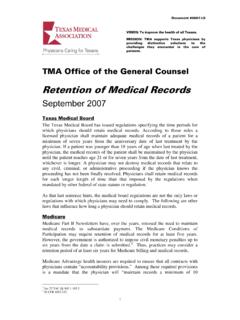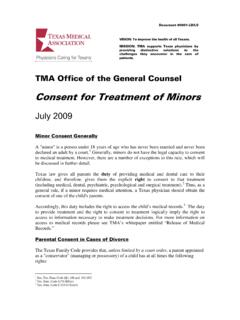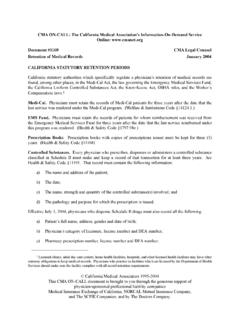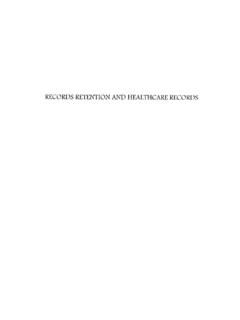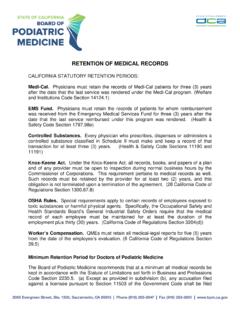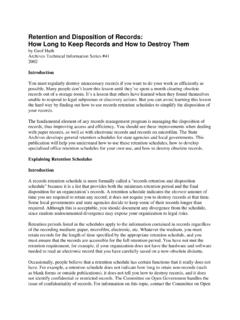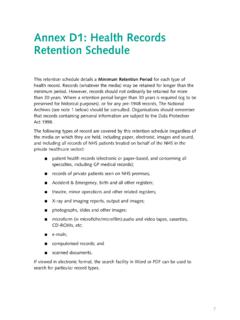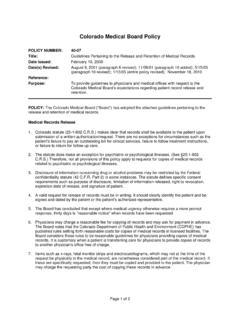Transcription of Retention of Medical Records - Oracle
1 Texas Medical BoardThe Texas Medical Board (TMB) has issued regulations specifying the periods for which physicians should retain Medical Records . According to those rules, a licensed physician shall maintain adequate Medical Records of a patient for a minimum of seven years from the anniversary date of last treatment by the physician. If a patient was younger than 18 years of age when last treated by the physician, the physician shall maintain the patient s Medical Records until the patient reaches age 21 or for seven years from the date of last treatment, whichever is longer. A physician may not destroy Medical Records that relate to any civil, criminal, or administrative proceeding if the physician knows the proceeding has not been finally resolved. Physicians shall retain Medical Records for such longer lengths of time than that imposed by the regulations when mandated by other federal or state statute or that last sentence hints, the Medical board regulations are not the only laws or regulations regarding Medical record Retention with which physicians may need to comply.
2 The following are other laws that influence how long a physician should retain Medical Part BMedicare Part B educational materials have, over the years, stressed the need to maintain Medical Records to substantiate payment. The Medicare Conditions of Participation require Retention of Medical Records for at least five years after the discharge of a However, the government is authorized to impose civil monetary penalties up to six years from the date a claim is presented, a request for payment was made, or an incident Thus, it would be prudent for practices to consider a Retention period of at least six years from the date of payment for Medicare billing and Medical AdvantageMedicare Advantage health insurers are required to ensure all contracts with physicians contain accountability provisions. Among these required provisions is a mandate that the physician will maintain Records a minimum of 10 years.
3 4 Specifically, Records and information related to services provided under a Medicare Advantage agreement must be kept at least 10 years from the final date of the Centers for Medicare & Medicaid Services (CMS) contract period in effect at the time the Records were It is very important to review any contracts the practice may have with Medicare carriers to determine the necessary Retention Managed Care RecordsFederal regulations specify the types of Records that cost-based and risk-based HMOs and competitive Medical plans (CMPs) must maintain. A provider contract may include provisions stating a physician shall maintain Medicare managed care-related Records for the same period that the HMO/CMP itself must maintain Records (three years from the settlement date of the contract between the HMO/CMP and CMS).6 Federal regulations also specify that CMS has access to the books and Records of the HMO/CMP to evaluate the quality, appropriateness, and timeliness of Thus, the contract may require physicians to grant similar access to the HMO/CMP and CMS.
4 Practices might want to review their 1 22 Tex. Admin. Code `2 42 42 Medicare Managed Care Manual, Provider and Supplier Contract 42 (d)(2).6 42 and 42 : To improve the health of all : TMA supports Texas physicians by providing distinctive solutions to the challenges they encounter in the care of of Medical RecordsTMA Office of the General CounselAUGUST 2017 PAGE 2various managed care contracts and become familiar with the Retention and access-to- Records provisions contained within them. MedicaidIn the Medicaid program, all Records should be kept for at least five years from the date of the service or until all audit questions, appeal hearings, investigations, or court cases are resolved, whichever is The term Medicaid Records includes not only Medical Records but also financial Records (claims, remittance and status reports, checks, and the like).
5 9 Freestanding rural health clinics (RHCs) must retain their Records for a minimum of six years, and hospital-based RHCs must retain their Records for a minimum of 10 The Records Retention requirements do not affect any time limits for pursuing administrative, civil, or criminal will want to review any updated agreements regarding Retention policies. Practices also may want to visit Texas Medicaid and Healthcare Partnership s (TMHP s) website at TMHP is the Medicaid claims manager for RecordsPhysicians who maintain stocks of dangerous drugs in their office are required to maintain Records of acquisition and disposal of such drugs for two years after the date of the acquisition or (Note: Pharmacists, not physicians, retain dangerous drug prescriptions for two years). Physicians who maintain inventories of controlled substances for administration, dispensing, or research must maintain Records of their inventories for at least two years from the date of the An inventory must be taken at least every two Prescription Drug Monitoring ProgramIn 1997, the Texas Legislature revised the sections of the Health and Safety Code that once had required the use and Retention of triplicate prescriptions.
6 Under the current prescription drug monitoring system, only the pharmacist is responsible for maintaining Records of controlled substance prescriptions and reporting to the Texas State Board of Pharmacy. Physicians are charged with taking reasonable precautionary measures to ensure others do not use the official prescription Deceased PatientsThe Medical Records of deceased patients should be kept at least seven years from the date of last 1992, the Occupational Safety and Health Administration (OSHA) has required all physicians who are employed by or have a contract with an employer for the purpose of treating employees with occupational exposure (meaning employees subject to a toxic substance or harmful physical agent in the course of employment through any route of entry) to maintain Records on such employees for the duration of employment plus 30 Employee exposure Records include a record containing environmental (workplace) monitoring or measuring of a toxic substance or harmful physical agent.
7 Related collection and analytical methodologies, calculation, and other background data relevant to the interpretation of the results obtained; and biological 8 1 Tex. Admin. Code Texas Medicaid Provider Procedures Manual, , Retention of Records (June 2017).10 HHSC Medicaid Provider Agreement (July 1, 2017).12 Tex. Health & Safety Code 21 21 (c).15 See Tex. Health & Safety Code See 22 Tex. Admin. Code (b)(1).17 See 29 2 PAGE 3monitoring results that directly assess the absorption of a toxic substance or harmful physical agent by body systems. Additionally, a Medical practice must maintain employee Medical Records for the duration of employment plus 30 years. Both the exposure and the Medical Records requirements apply to bloodborne If a Medical practice is to be closed with no new physician taking it over, the physician shall notify affected current employees being treated of their right of access to Records at least month prior to the cessation of the Additionally, either the Records can be transferred to the National Institute for Occupational Safety and Health (NIOSH), or employers must notify the director of NIOSH in writing of their intent to dispose of the Records three months before that MammographyThe Texas Department of State Health Services requires that clinical images of mammography be retained by the entity that produces them.
8 The Retention schedule is: Five years, or Ten years if no additional mammograms of the same patient are performed at the facility. This essentially means the Retention period is 10 years for single-encounter mammograms. If a patient s Medical Records are sent permanently to another Medical institution, the receiving institution will maintain and become responsible for the original film until the fifth or 10th anniversary as specified Comments on Federal and State Tax RecordsFor those Records kept for federal tax purposes, the law is somewhat unclear. The Internal Revenue Service (IRS) regulations simply provide that any person subject to tax .. shall keep such complete and detailed Records as are sufficient to enable the [IRS] to determine accurately the amount of liability. Keep tax returns and supporting information three years from the date the return was IRS Publication 552 advises keeping Records two years from the date the tax was paid, or three years from the date the return was filed, whichever is longer.
9 Keep Records pertaining to depreciating assets indefinitely (IRS Publication 552). Keep Records of amounts paid to employees for four years after the date the return is filed, or the due date of the tax, whichever is The IRS can bring a legal action to recover unpaid tax based on unreported income that is more than 25 percent of the income shown on the return for six years after the filing of the Note that the IRS can bring a legal action based on the filing of a false or fraudulent tax return indefinitely because a fraud action can be brought at any The rules do not seem to distinguish between taxpaying entities that are sole proprietorships, partnerships, or professional corporations. Because of highly technical aspects of federal tax law, it is strongly recommended that physicians consult with their accountant and/or tax attorney to determine the proper Retention period for their 18 See 29 19 See 29 Occupational Safety and Health Administration, Access to Medical and Exposure Records (2001).
10 21 See 25 Tex. Admin. Code (t)(4)(D).22 26 (a) 26 (e)(2).24 26 (e) 26 (c) 4practice. Readers may want to obtain IRS Publication 552, Recordkeeping for Individuals. In addition, the highly technical Guide to record Retention Requirements, published by CCH, covers many situations and is available through internet booksellers. The guide is intended for accountants and tax For physicians subject to the state franchise tax, the Texas Tax Code provides that such taxes may be assessed up to four years after the time the tax becomes This arguably translates into a four-year Retention period for financial Records of the physician practice. As particular tax circumstances may dictate differing Retention periods, again, it is prudent to contact your tax advisor for Care PlansTexas law does not govern the length of time a managed care plan must require physicians with which it contracts to retain Records .
